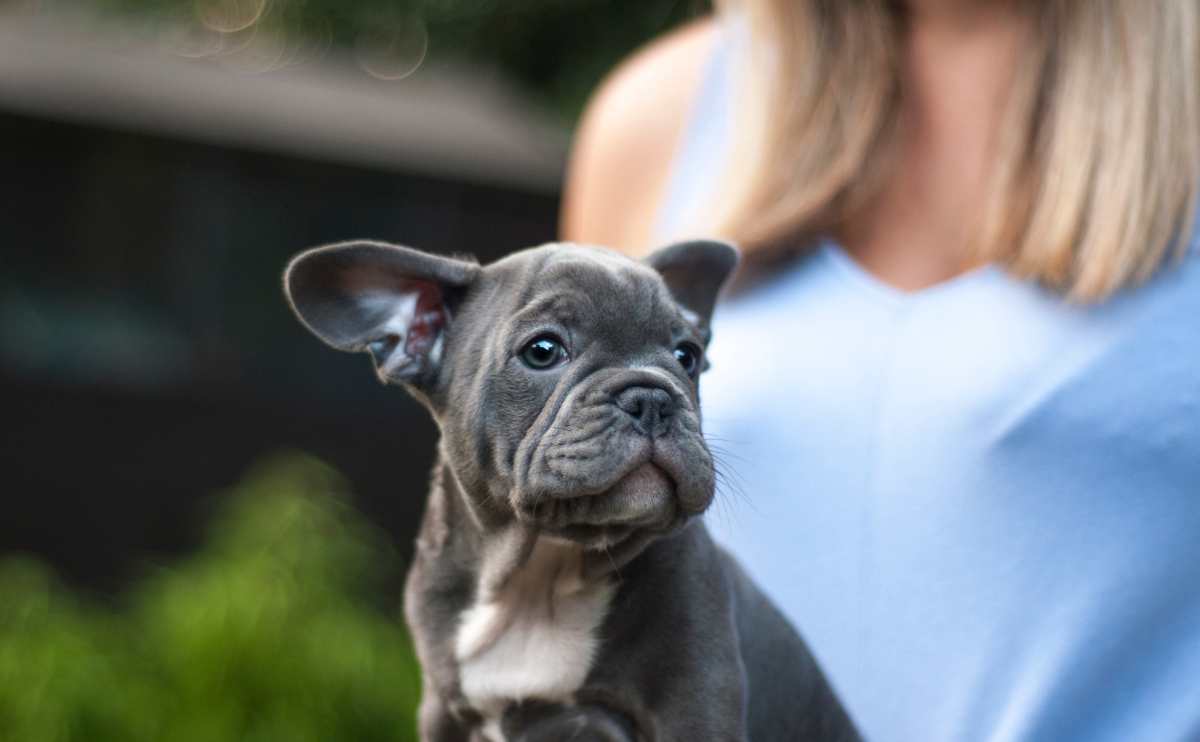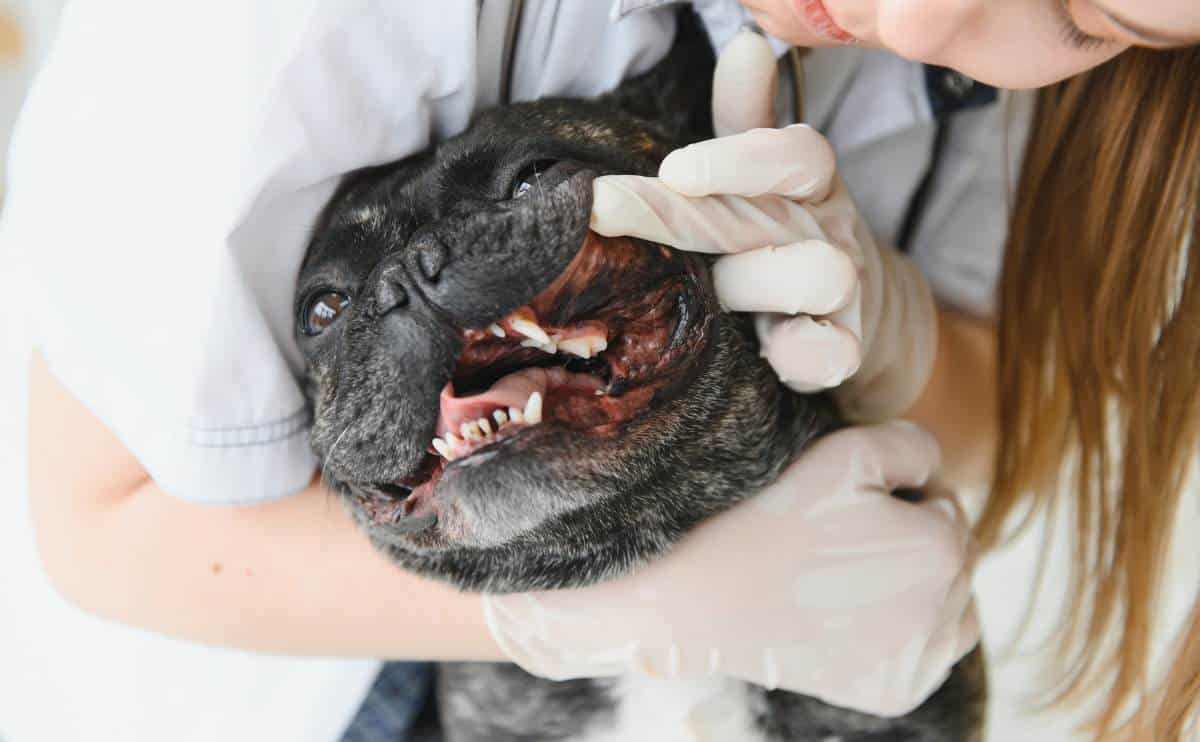French Bulldog Guide: Cost, Lifespan, Colors, Temperament, Size & More
When you purchase through links on our site, we may earn a commission. Here’s how it works.

French Bulldogs. also called Frenchies, are tiny bundles of canine joy. They are family dogs, love attention, and will happily spend time with kids and adults. The result of breeding miniature Bulldogs, Frenchies love people and fit well into small families. They are small, comfortable with limited living spaces, and require quick daily walks. However, they do tend to be challenging to keep healthy, and many have an independent, stubborn streak.
Table of Contents
Is the adorable, scrunchy-faced Frenchie the right pup for you? Let’s find out.
French Bulldog Breed History

The French Bulldog originally came from England, where “toy bulldogs” were the favored pet of lacemakers. During the Industrial Revolution, many of the lacemakers moved to the French countryside, and it was there that, through generations of breeding, the French Bulldog came to be. There’s a disagreement about how this dog originated, but the popular idea is this breed came from the toy version of the Bulldog crossed with a Pug and Terrier.
Eventually, Parisians came to know and love the French Bulldog, and they became a staple of city life in Paris. At this point, they were known as Bouledogue Francais or French Bulldogs. Word of these small dogs made their way to the fashionable cafes and parties of Paris, and soon, the Bouledogue Francais became a staple of Parisian high life.
Breed Recognition
This breed was officially recognized in 1898 by the American Kennel Club (AKC).
According to the Federation Cynologique Internationale (FCI), the first French Bulldog Club was founded in 1880. The first breed standards were also established in 1898, the same year when the French Kennel Club recognized the breed. As early as 1887, they started appearing in dog shows and exhibitions.
The French Bulldog Club of America explains that one of the biggest controversies surrounding the breed was its ears when American breeders insisted dogs adhering to the breed standard had bat ears. In one Westminster show in 1898, the Americans refused to participate as there were rose-eared dogs at the show. The American judge did not take part, and the American dog owners pulled their dogs. They held their own show at the Waldorf-Astoria.
The World Wars and the Great Depression created a decline in the interest in purebred dogs, and the French Bulldog was no exception. By the 1940s, only 100 were registered with the American Kennel Club. Fortunately, by the 1980s, interest was restored, with wave upon wave of new registrations. Today, Frenchies continue to appear in popular media, with more and more breeders taking action to better care for them.
Didi You Know?
The French Bulldog breed cannot reproduce naturally. Due to its narrow hips, weak hind legs, and heavy build on top, male Frenchies can’t mount females. So, they must be artificially inseminated to procreate. Also, because of the breed’s large head and small hips, often the mother needs a c-section, which makes breeding expensive.
French Bulldog Temperament

Frenchies are active, friendly people-pleasers who work well in a family setting. They are sociable, lively, and always ready to give their owners a good laugh. Since they are avid people-pleasers, they are quite easy to train. However, this is at odds with their tendency for independent action and thought.
This breed doesn’t make the cut in the smartest dog breeds contest, but that doesn’t mean they lack intelligence. They seem to understand commands but choose to obey or disobey based on their mood, which some consider to be extreme intelligence.
Firm guidance must be employed to remind a Frenchie who’s in charge. Yelling at them will not yield great results. Frenchies are very sensitive to human voices, and aggressive yelling may simply cause them to fear their family. You must start obedience training and socializing them young so they know how to act around other people and pets.
While Frenchies are primarily family dogs, they can get overly protective of their owners and will reject strangers. Proper socialization is important to mitigate this problem. Puppy training classes are also important for the Frenchie to distinguish acceptable from unacceptable behavior.
Frenchies are not typically good watchdogs as they do not bark very often, and their barking is not very powerful. However, they are sometimes vocal if an outsider approaches, so depending on one’s visitor circle, a Frenchie owner may want to pay special attention to socializing their dogs with strangers.
Frenchie Size & Appearance

French Bulldogs stand from 11-12 inches at the shoulders. The AKC standard states that they usually will not exceed 28 pounds in weight. They have short, stocky bodies with legs splayed wide apart, giving them a low center of gravity. They are expected to live anywhere from 8 to 13 years, though different dog breeding associations disagree on the true margin.
Frenchies are compact, muscular dogs with cylindrical barrel-shaped chests and firm muscles. Breeders monitor their skin, and the most conscientious insist that dogs adhering to the breed standard have no excess skin or wrinkles except for their faces. These days, bat-eared dogs are the norm.
One of the most striking features of the breed is their face. Similar to American Bulldogs and Pugs, French Bulldogs have shortened muzzles, with the nose turned upwards, known as a snub nose. The muzzle has pronounced jowls that meet at loose, black lips. Their lips should completely cover the teeth and tongue. Most have black noses, while cream or fawn-colored dogs tend to have lighter noses.
They have a minor hump above their humps, a feature known as “roach-back.” As a consequence of this, the hind legs are a little longer than the forelegs. Lastly, this breed has short, low tails that taper at the tip.
What Is A Mini Frenchie?
Just when you thought Frenchies couldn’t get any cuter, along comes the Mini French Bulldog or Teacup French Bulldog. This microbreed is a miniature version of a standard French Bulldog that is bred down in size. Mini Frenchies are about half the size of a French Bulldog and weigh between 5 and 14 pounds.
Unfortunately, this miniature version of the breed can be associated with additional health risks. If you think this is what you want, do your research so you’re aware of the potential concerns and complications that may arise.
Coat & Colors

French Bulldogs usually have short, glossy coats and lack any undercoat. There’s also a long-haired French Bulldog, also known as a fluffy Frenchie, with wavy, medium-length hair over their ears, head, back, and chest. This hair gives them a fluffy appearance. Frenchie’s coats are soft and are generally easy to groom. They come in a variety of colors, but breeding associations generally include white, cream, fawn, or black in any combination.
The French Bulldog breed also comes in a variety of markings, listed below:
Brindle: This refers to an uneven coloring pattern that is sometimes described as “tiger-striped.” In brindle-striped coats, streaks of color run across the fur. Brindle markings are a lot thinner, more irregular, and less opaque than actual tiger stripes. In this breed, brindle is made up of black and fawn hairs.
Piebald: This marking pattern refers to a coat with patches of pigmented fur, with other patches left white. In French Bulldogs, the colored patches tend to be on the back, under the neck, and around the ears and eyes.
Black Mask: As the name suggests, this coloring involves a fawn or cream dog with black fur around the muzzle and sometimes around the eyes.
Ticking: This pattern presents as many tiny dots and flecks of one color on another, though not in a brindle stripe pattern. The American Kennel Club generally accepts ticking but does not find it very desirable in this breed.
Other Colors
Other “rare” or “fad” colors like black, blue, pure white, and merle do exist in certain dogs, with some breeders claiming them to be breed standards. However, various breeding associations disqualify such rare colors, considering them to be outside of the breed.
The pure white gene, for example, carries the deaf gene. Frenchie breeders are quite aware of this, and most breeders that offer the “fad” colors tend to be in it just for the money. With this in mind, only buy from responsible breeders, or better yet, adopt!
Exercise & Living Conditions

Fortunately for many city and apartment dwellers, Frenchies do not need a lot of space and will thrive in almost any place where they can get regular contact with their owners. Given their constricted breathing, Frenchies do not do well with hot and humid weather. They cannot be left outdoors in a kennel but must be kept indoors, preferably in air-conditioned surroundings. They should be kept occupied indoors, preferably through the use of Frenchie-sized dog toys.
According to the French Bulldog Club of England, Frenchies are not accustomed to long walks, though they can handle quick 15-minute walks. These quick, leisurely strolls are enough for Frenchies to avoid falling into obesity. They prefer to play, so a trip to the local park may be in order. If the weather is hot or humid, the Frenchie must not be brought outside. Given their body structure, Frenchies cannot swim and must never be left alone near a body of water.
French Bulldogs love to play. Fortunately, they won’t chew up the place or tear beds and couches apart if they don’t get enough playtime. However, they will start feeling anxious and uneasy if they do not interact with their family for an extended period of time. Apartment dwellers may fare well with owning a Frenchie, but not if they disappear for work for weeks at a time. Frenchies also tend to drool and release flatulence, so people who get quickly grossed out may not live well with this breed.
Training

French Bulldogs can be extremely stubborn to train. Despite their size, they pack a lot of power and strength into their pint-sized little frames. This makes it essential that you start training your Frenchie at an early age. This means making sure your pup can properly walk on a leash or with a Frenchie-sized harness.
Training this breed is important to help them live a civilized life. Frenchies have big personalities and should be taught to walk on a lead, heel, stay, and other commands to keep them under control. Treats can motivate Frenchies and help with training.
If you plan to crate train, you’ll want to find a medium-sized dog crate that allows you to train your pup while you are away. Frenchies are known for having separation anxiety, so keep that in mind, as you may need to purchase a secure dog crate that alleviates anxiety.
Health

Just like other breeds with upturned noses, Frenchies are disproportionately affected by numerous health problems. Some of the most notable are related to their breathing. Their compressed nasal passages may make breathing difficult, and doubly so in hot weather.
“The most common problem I see with French Bulldogs in my practice is brachycephalic obstructive airway syndrome (BOAS), says Dr. Rebecca MacMillan, a companion animal veterinarian and surgeon in Gloucester, United Kingdom. “Many Frenchies have breathing issues to varying degrees. These are caused by their narrowed, slit-like nostrils, flattened faces, elongated soft palates, and narrowed tracheas (windpipe). Skin allergies are also extremely common in this breed,” shares Dr. MacMillan. “I regularly see Frenchies for this issue. If your dog licks his paws frequently, scratches excessively, or has sore ears or patches of skin, then you must seek veterinary help for this.”
French Bulldogs are also poor flyers, as the decompression of high flight may hit them more severely. Several airlines have banned the breed from flying for this reason. If there is no other choice, special care and attention must be taken to ensure that a Frenchie can survive a flight.
The French Bulldog Club of America recommends several health tests prior to purchasing a puppy, though only a few will be discussed in detail.
- Hip Dysplasia Testing
- Eye Examination by a boarded ACVO
- Patellar Luxation
- Congenital Cardiac Database
- Autoimmune thyroiditis testing
- Juvenile Cataracts testing
Hip Dysplasia
Frenchies are vulnerable to hip dysplasia, given their stocky body structure. Hip dysplasia is a condition where the hip bone and the thigh bone of dogs are connected through a “ball and socket” joint, with the thigh bone as the ball and the hip bone as a socket. The ball is meant to fit snugly in the socket. In normal growth, this ball and socket joint allows for movement in many different directions.
In hip dysplasia, the hip socket might grow too shallow, or the thigh may simply be displaced due to abnormal tissue growth. Hip dysplasia can be detected through a dog’s gait; a Frenchie may be suffering from hip dysplasia if their pelvises sway from side to side while walking or if their legs are crossed or splayed sideways while sitting. This condition can be addressed with vet visits, specialized exercise, painkillers, and a special diet.
ACL Tears
An ACL tear is a condition that affects the cranial cruciate ligament, one of several ligaments in the hind leg of dogs that connects the thigh to the shin. Frenchies are especially affected by this, given the weight distribution of their bodies. A dog that gets an ACL tear may experience sudden pain in its leg and lose the ability to put weight on the affected limb. They may gradually regain the use of their leg, but it still may cause them pain. ACL Tears are typically treated with surgery, but some cases just require rest and physical therapy.
Other health problems may affect Frenchies, including eye infections, ear infections, pyoderma, dermatitis, and heat stroke, but it is usually best to address them on an individual basis. Each dog is different and may have different needs.
Due to the potential costs associated with your French Bulldog’s healthcare needs, you may want to consider pet insurance right away to help handle the financial responsibility.
Nutrition For Your French Bulldog

The best way to determine what you should feed your pet is to talk to your vet. They have the best understanding of your specific pet’s dietary needs. We also have our best food options for Frenchies. When you know what they need, then check out our experts’ recommendations of the best dog foods for most diet types, ages, and health concerns to help you narrow down the choices available.
Frenchies are curious and interested in new things. This means that they may soon grow bored with their dog food and beg for table scraps. They want to be involved in what the humans are eating! Unfortunately, they are prone to obesity, and eating cooked bones and high-fat foods may cause a Frenchie to gain too much weight.
The same goes for treats. The breed is prone to develop more complications from obesity than other dogs, given their body structure and breathing problems. Research into which foods are safe for Frenchies, the best treats available, and how much food to feed may be in order.
Grooming

Fortunately for many dog owners, Frenchies don’t need too much fuss from a professional groomer! As mentioned earlier, Frenchies have short fur with no undercoat. They also shed over the year, though in very small quantities at a time. This coat simply needs weekly brushing with a grooming mitt or a medium brush. Regular brushing ensures that shed fur is removed. It also distributes the coat’s natural oils to give it a beautiful sheen. You must also keep your pup’s nails clipped to a comfortable length.
Fortunately, French Bulldogs don’t tend to like getting too dirty in the outdoors. However, getting a bit of mud and dirt is sometimes unavoidable. Regular bathing helps keep a Frenchie clean and fresh. Special care must be taken to clean in between their facial folds, as dirt can all too easily accumulate there. Their eyes are of special concern since the wrinkles around a Frenchie’s eyes are often moist and can grow yeast. Regular dog shampoo is fine, but a sensitive skin shampoo is best for Frenchies with dry or irritated skin.
Brushing a Frenchie’s teeth several times a week is also a good way to keep their teeth and gums healthy. It is important to use toothpaste made specifically for dogs, as the fluoride in human toothpaste is harmful to dogs. Frenchies may also benefit from monthly ear cleaning.
French Bulldog Breeders & Puppy Costs

French Bulldog puppies with higher pedigrees can cost from $1,500 to over $4,000. Some very rare fluffy Frenchies have even had a price tag of $12,000+.
As with all dog breeds, it is important to acquire your French Bulldog puppy from a respected breeder unless you choose to adopt. The French Bulldog Club of England recommends that puppies be acquired from parents who have been through health tests and vaccinations. It is also important to see the puppies with the parents to be assured of everyone’s health. The price of French Bulldog puppies can vary greatly, but they are on the expensive side.
Many responsible breeders will have a lot of information regarding the parent dogs, being able to trace a dog’s pedigree down through several generations. This means that they will have a lot of specific information regarding their genealogy, what health risks run through the family, and where their dogs’ ancestries lie. The Humane Society of the United States lists several traits of responsible breeders, which include transparency and a working relationship with local veterinarians.
Rescues & Shelters
You can also consider adopting a pup from a French Bulldog rescue organization. While this may reduce the cost of getting a Frenchie, you might have to wait until adoption is available.
Make sure you do your research on each rescue and ensure that they are registered and hold high standards. As always, it is best to get a dog from a no-kill shelter, where you can be assured that the shelter has the well-being of its residents in mind. Responsible shelters also prepare prospective owners for the adventure of owning a new dog and will provide people with information and lists of supplies needed to welcome a new dog home. Decide on the perfect Frenchie name before bringing the dog home.
Many dogs from shelters are also senior dogs! Make sure you know what you are getting into when getting a senior dog, especially if they are a Frenchie. Older Frenchies tend to have many health issues, so one must do their research and make enough preparations to welcome a senior Frenchie into the family.
Adorable Frenchies (Video)
This four-minute video from Griffin Frenchie shows you 10 reasons you might not want a French Bulldog. Spoiler alert: they’re actually reasons why you won’t be able to resist loving these adorable pups.
Frequently Asked Questions
Below, I’ve covered some of the most commonly asked questions about the French Bulldog. If I missed yours, let me know in the comments.
Why Do French Bulldogs Fart So Much?
French Bulldogs are known to have a sensitive stomach and eat very quickly. These two things can cause them to be quite gassy. Be vigilant about keeping their diet steady as new foods can upset the balance, and watch out for signs of a food allergy. Slow down their eating by looking for a slow-feeder dog bowl that can help them pace themself or consider foods good for gassy dogs. And learn more about dog farting remedies.
Why Are French Bulldogs Such A Popular Breed?
The French Bulldog is the most popular dog breed, perhaps because they are low energy and adaptable to any home, even a tiny apartment. They’re also comfortable living with individuals or families. It doesn’t hurt that they are also quite cute.
Since 2011, Frenchies have gone from ranking 18th on the AKC most popular breed list to taking 1st place consecutively in 2022 and 2023. This increase in popularity is not just about their size and appearance. Their temperament plays a role as well. They’re a total package and meet the needs of lots of people and families looking for the right pet. French Bulldog mixes, like the Frenchie Pug, are also popular.
To learn more about French Bulldogs, you can buy The French Bulldog Handbook and look at our interviews with Manny the Frenchie and Sir Charles Barkley.
Are You Ready For A Dog?
French Bulldogs can be amazing pets, but before bringing home any breed, you must be sure you are ready for a new pup. There is a lot to consider, from the financial commitment, how much time you have to spend with them, and if you have children or other animals in the home. And, with a breed like the Frenchie, there are extra factors like the breed’s health issues and special care needs. Learn more before making a decision: Reasons Not to Get a French Bulldog.
Why Trust Canine Journal?
Michelle has been a dog owner her entire life and is one of the founders of this website. She currently owns two mixed-breed rescue dogs. Michelle is also a licensed insurance agent who specializes in pet insurance. She’s part of a team of dog specialists at Canine Journal who have over a decade of experience researching, testing, and writing about everything you need to know to keep your pup healthy and happy.



